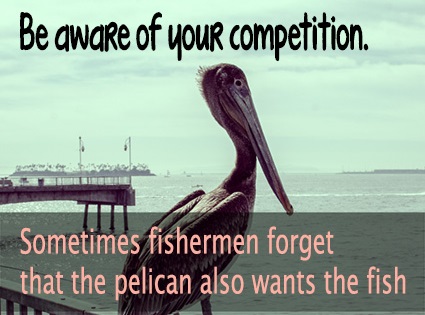Google Ads let you show your goods and services to people who are looking for those goods and services. You pay only when someone clicks through, and costs are likely to be far less than for traditional print ads or broadcast ads.
But Google Ads also present your competitors to searchers. Where you can own a page of organic results, you will definitely share ad space with competitors.
Top billing
According to Wordstream, the top two PPC ads can expect to receive about 41% of all clicks for commercial keyword terms. Commercial means the kinds of things people type in when they are ready to buy, like “buy hair care products” or “cheapest vitamins.” Now this is not saying that 41% of the people who click on the ads choose the top two and more than half choose a different ad. This includes the people who click on organic results, too.
SearchWatchEngine reported specifically on click through rates for ads, and found that ads which averaged position 1 had click through rates (CTR) averaging 12.2%, those with an average position of 1.5 got 4.3%, and position 2 got 1.5%. Once your ad gets below position 2, your CTR will probably be less than 1%.
We haven’t seen CTRs that high for all first-position ads, but the author explained that he had filtered out all ads with low numbers of clicks, so that he could focus on comparative CTRs. The message remains fairly clear: the top two ad positions are where you want to be.
If your ads lose their high position
The first thing to check on is this: have you made changes at your website? If you’ve changed the text on the landing page so that it is no longer highly relevant to the ad, you can expect to lose some points on your quality score. If you fail to keep up your code so that your website now loads slowly or performs badly on devices that are showing your ads, your quality score will suffer. We’ve seen cases in which a dynamically populated page of products quit showing products. As you can imagine, that page was no longer a useful landing page.
But it might be that you have not made any changes, intentional or unintentional. In that case, the most likely thing is that your competitor has.
Placement of ads is determined by auction. Your quality score and the amount you’re willing to pay are combined to determine your rank. So, if you’re willing to pay $N for your ad and you have a great landing page, you might still have a higher placement than your competitor who is willing to pay $N+1. Maybe not if they’re willing to pay $N+8, though.
Here are some things that a competitor can do which can affect your ad placement:
- Bid more for the keyword in question
- Improve their ads so people click through more
- Optimize their landing pages
- Do these things across the board so that they have a higher quality score for their whole account
These can be changes made by a known competitor, but you may also have a new competitor.
Do you have a new competitor?
The pelican in the picture above is a competitor to the fisherman, but the fisherman might not be aware of that. We had an interesting case with a client of ours that bids on keywords like “Puerto Rico politics” and “Puerto Rico news.” As the tourist season approached, a major resort in Puerto Rico apparently snapped up all keywords including the term “Puerto Rico.” The front page bid for those terms tripled overnight.
Now this hotel didn’t get a lot of conversions from “Puerto Rico politics,” so it was just a matter of weeks before their ad manager dropped our keywords and we were able to afford top placement again. But a competitor with deep pockets can cause trouble even when, as in this case, they don’t deserve the top spot.
What can you do?
Getting top rankings for PPC
- Keep your quality score as high as possible. The ideal is to choose a very relevant keyword, write a compelling ad specifically for those people who are searching for that keyword, and link to a special landing page that speaks directly to those people and lets them get exactly what they want. Get as close to that ideal as your resources allow.
- Be aware of your competition. If your competitor is more established than you or has significantly more resources, you will need a different strategy from the one you’ll use if their business is equal to yours and they just have better ad copy. Don’t just look at the other fisherman, either — remember the pelicans. Someone may want your keywords and yet not be your obvious real-world competition.
- Go for the long tail. Maybe you can’t have the keyword you want right now. One of our clients uses the keyword “urgent care.” They can compete strongly with other local providers of urgent care, but a national campaign knocked them down for a few weeks. During that time, it made sense to go after more specific terms, including geographic queries and keywords relating to the local university. Identify the specialized keywords that match your company’s special strengths.
Competition for top organic placement is higher than ever, and ads have more of the search engine screen than ever. Nowadays, paid search is an important part of the marketing mix for most companies. Get the most from your investment in CPC by following best practices and keeping a good eye on your competitors.


Leave a Reply